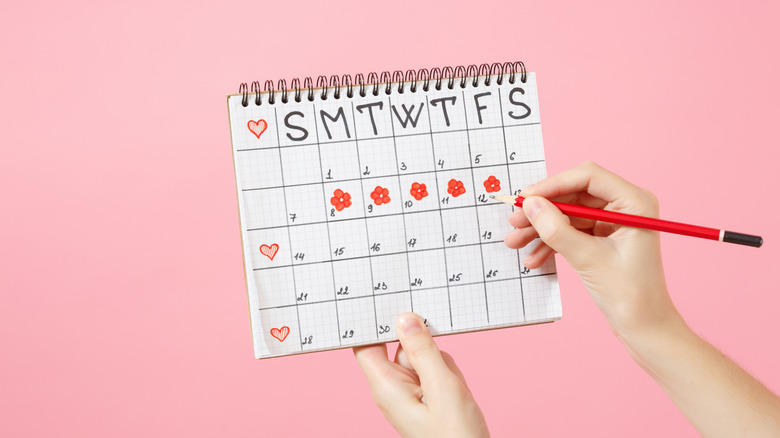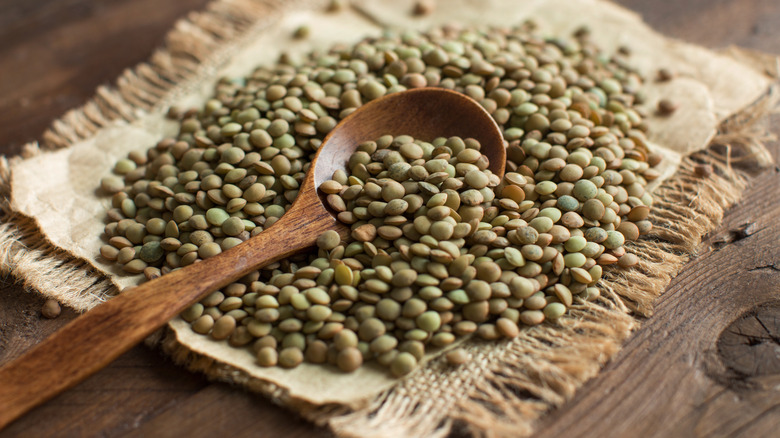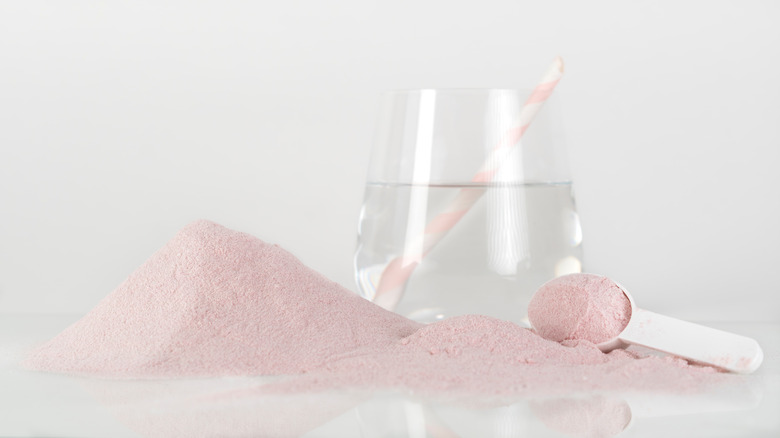Can You Naturally Delay Your Menstrual Cycle?
Maybe you have an exciting trip planned or you want to run a marathon soon. Or you might have a big date coming up that you want to feel your best for. Whatever the reason, there comes a time when you don't want your menstrual cycle interfering with your life. According to Healthline, common menstrual symptoms include cramping, breast tenderness, fatigue, bloating, migraines, and acne — all things you may want to delay during an important event.
Delaying or skipping your period is generally safe, says GoodRx Health, and hormonal birth control can be used to control when you menstruate. Some birth control types are intended to trigger a period once every three months, while others eliminate menstruation over time.
For some women, however, these options may not be ideal. If you don't want to rely on hormonal contraceptives or just want to delay a single period, you might consider natural alternatives. Here are some common natural remedies to delay your period — and the truth about their effectiveness.
Fruit drinks
Acidic fruit juices and drinks have been said to delay menstruation in women, according to Healthline. This includes apple cider vinegar and lemon juice. Lemon juice, in particular, spawned a trend on TikTok, where users shared videos discussing the merits of drinking lemon juice to delay menstruation (per Today). While some believe that taking shots of lemon juice will stop or delay their period, doctors say there's no evidence to support the method.
Similarly, there's no evidence that apple cider vinegar works to delay or stop the menstrual cycle. One 2010 study published in Endocrine Practice did look at the effect of lime juice on ovulation in rats and concluded that the juice could block ovulation. However, similar cases in humans are only anecdotal. At best, citrus juices may only help to ease period cramps, gynecologist Dr. Jessica Shepherd told Today.
Besides being ineffective, repeatedly taking shots of apple cider vinegar, lemon juice, and other acidic fruit drinks may cause irritation. The acid in these juices could damage tooth enamel, the gums, the throat, and the digestive system.
Gram lentils
There are numerous health benefits of lentils, from gut-boosting fiber to anti-inflammatory properties. Cleveland Clinic argues that these little seeds are beneficial for almost anyone and in any diet (the only exceptions are people who have a lentil allergy or who may struggle to absorb nutrients like iron and zinc).
According to Healthline, some also claim that gram lentils can naturally delay your period. Women's wellness brand Bellabeat explains that gram lentils are thought to alter hormone levels because they contain phytoestrogens, chemicals that mimic estrogen in the body. Consuming large quantities of lentils, in theory, would interfere with the hormones that dictate different stages of the menstrual cycle.
MedicalNewsToday confirms that lentils are a good source of phytoestrogens and that eating foods high in phytoestrogens can impact menstruation. However, this is likely limited only to menstrual symptom relief — such as alleviating fatigue — rather than delaying menstruation. Additionally, side effects of overconsuming lentils or lentil flour can include stomach discomfort, bloating, and gas.
Gelatin
When you think of gelatin, you might imagine jello in a rainbow of colors. Gelatin is used in much more than wobbly translucent desserts, however. According to WebMD, the ingredient is derived from animal collagen, usually from cows or pigs, and can be found in capsules, cosmetics, and a variety of food items. And according to some, however, gelatin could be the key to naturally delaying your menstrual cycle.
The Times of India suggests that drinking a packet of gelatin powder or granules mixed in water three times a day can ward off your period. Healthline notes that one glass of the mixture is said to work for about four hours. To continue delaying menstruation, then, the gelatin treatment should be repeated every few hours.
Not only is this remedy difficult to maintain, but it's also not that effective. Currently, no medical research supports the use of gelatin for menstrual cycle disruption. On top of that, the ingredient may cause stomach discomfort, bloating, belching, heartburn, or serious illness if contaminated with unsafe animal tissue (per RxList).
Mental and physical stress
Stress is known to disrupt menstruation and sometimes lead to late or irregular cycles (per Cleveland Clinic). This is due to the release of the hormone cortisol in the body. When cortisol remains high, periods may be lighter than usual — or not come at all.
Stress — especially physical stress — can impact other hormones in the body, too. For example, over-exercising can trigger the brain to slow or stop the release of hormones related to ovulation and menstruation (per Healthline). Weight loss can also put the body under stress, leading to a delayed or lost period. "This is because not only is oestrogen produced by the ovaries; it can also be created in fat tissue," gynecologist Dr. Shirin Irani told Women's Health. Without enough fat, the body may lack the hormones needed to produce a period.
If you've been thinking of toning up or losing weight, trying a new diet or exercise routine may seem like an ideal way to simultaneously delay your period too. However, losing a period this way is usually hard to control and isn't healthy overall. MedicalNewsToday notes that doctors typically urge patients to maintain a healthy weight, opt for moderate exercise, and manage mental stress to regain regular menstruation.
Non-natural options for delaying your menstrual cycle
Natural solutions to delay the menstrual cycle, from lemon juice to intense exercise, are ineffective or inconsistent, according to experts. Dr. Sherry Ross, a women's sexual health expert, told Prevention, "[Natural remedies] are unreliable and have no science behind their effectiveness." However, some non-natural remedies have been proven to strategically delay or disrupt menstruation, according to Healthline.
Hormonal birth control is a common method for postponing periods. The types of birth control that have been found to work include birth control pills, contraceptive patches, and vaginal rings (per GoodRx Health). Birth control isn't typically intended to delay periods, however, so it's best to get a doctor's approval before using this method to alter menstruation.
Another non-natural but also non-hormonal option is ibuprofen. Gynecologist Dr. Lauren Streicher explained to Insider that the over-the-counter pain reliever could delay a period by up to two days. However, high doses are required, and some doctors warn of serious side effects (per Cleveland Clinic). This method is not recommended.






